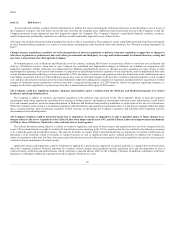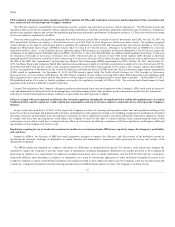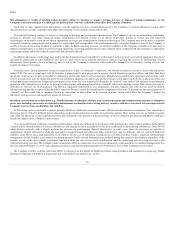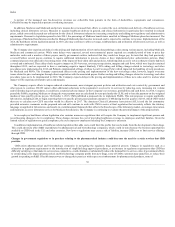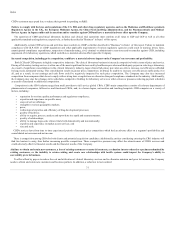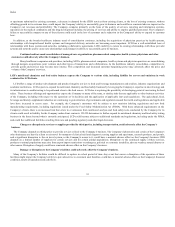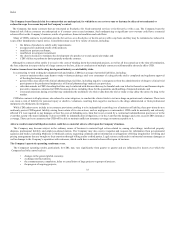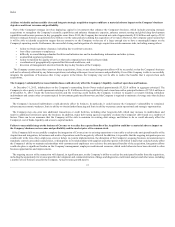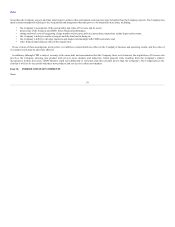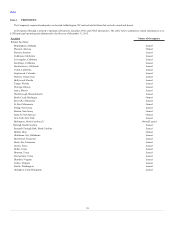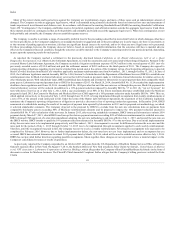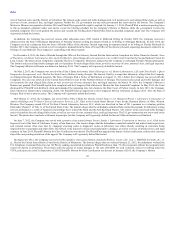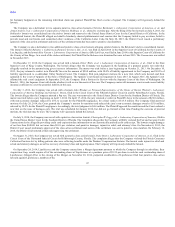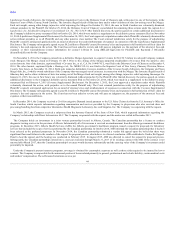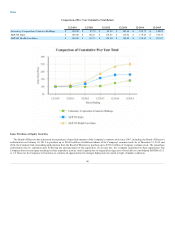LabCorp 2015 Annual Report Download - page 36
Download and view the complete annual report
Please find page 36 of the 2015 LabCorp annual report below. You can navigate through the pages in the report by either clicking on the pages listed below, or by using the keyword search tool below to find specific information within the annual report.
Index
In the event of a delay in the delivery of data, the Company could be required to transfer data collection operations to an alternative provider of server
hosting services. Such a transfer could result in delays in the ability to deliver products and services to clients. Additionally, significant delays in the planned
delivery of system enhancements, improvements and inadequate performance of the systems once they are completed could damage the Company's
reputation and harm the business. Finally, long-term disruptions in the infrastructure caused by events such as natural disasters, the outbreak of war, the
escalation of hostilities, acts of terrorism (particularly involving cities in which the Company has offices) and cybersecurity breaches could adversely affect
the business. Although the Company carries property and business interruption insurance, the coverage may not be adequate to compensate for all losses that
may occur.
Experienced computer programmers and hackers may be able to penetrate the Company’s layered security controls and misappropriate or compromise
personal information or proprietary or confidential information, create system disruptions or cause shutdowns. They also may be able to develop and deploy
viruses, worms and other malicious software programs that attack the Company’s systems or otherwise exploit any security vulnerabilities. Outside parties
may also attempt to fraudulently induce employees to take actions, including the release of confidential or sensitive information or to make fraudulent
payments, through illegal electronic spamming, phishing or other tactics. Although the Company believes that it has robust information security procedures
and other safeguards in place, which are monitored and routinely tested internally and by external parties, because the techniques used to obtain
unauthorized access, disable or degrade service, or sabotage systems change frequently and often are not recognized until launched against a target, the
Company may be unable to anticipate all of these techniques or to implement adequate preventative measures. In addition, as cyber threats continue to
evolve, the Company may be required to expend additional resources to continue to enhance the Company’s information security measures or to investigate
and remediate any information security vulnerabilities. The Company’s remediation efforts may not be successful and could result in interruptions, delays or
cessation of service. Breaches of the Company’s security measures and the unauthorized dissemination of personal information, proprietary or confidential
information about the Company or its customers or other third-parties, could expose customers’ private information and could expose customers to the risk of
financial or medical identity theft or expose the Company or other third-parties to a risk of loss or misuse of this information, result in litigation and potential
liability for the Company, damage the Company’s brand and reputation or otherwise harm the Company’s business. Any of these disruptions or breaches of
security could have a material adverse effect on the Company’s business, regulatory compliance, financial condition and results of operations.
The Company has business and operations outside the U.S. and CDD derives a large portion of its net revenues from international operations. Since the
Company's consolidated financial statements are denominated in U.S. Dollars, fluctuations in exchange rates from period to period will have an impact on
reported results. In addition, in certain circumstances, CDD may incur costs in one currency related to its services or products for which it is paid in a different
currency. As a result, factors associated with international operations, including changes in foreign currency exchange rates, could significantly affect CDD's
results of operations, financial condition and cash flows. Foreign currency exchange fluctuations and changes by foreign governments in reimbursement for
LCD’s services could have an adverse impact on the Company’s business.
The expansion of the Company's international operations exposes it to risks from failure to comply with foreign laws and regulations that differ from those
under which the Company operates in the U.S. In addition, the Company may be adversely affected by other risks of expanded operations in foreign
countries, including export controls and trade regulations, changes in tax policies or other foreign laws, foreign labor and employee relations laws and
regulations, restrictions on currency repatriation, judicial systems that less strictly enforce contractual rights, countries that provide less protection for
intellectual property rights, and procedures and actions affecting approval, production, pricing, reimbursement and marketing of products and services.
Further, international operations could subject the Company to additional expenses that the Company may not fully anticipate, including those related to
enhanced time and resources necessary to comply with foreign laws and regulations, difficulty in collecting accounts receivable and longer collection
periods, and difficulties and costs of staffing and managing foreign operations. In some countries, the Company's success will depend in part on its ability to
form relationships with local partners. The Company's inability to identify appropriate partners or reach mutually satisfactory arrangements could adversely
affect the business and operations.
36


